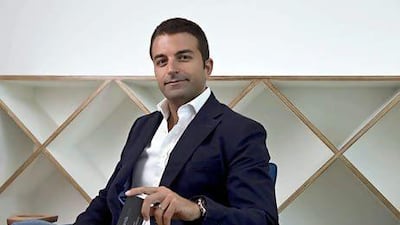New entrepreneurs such as Abed Agha, the founder of Vinelab, often get overlooked when it comes to preferential business rates offered to big corporations.
Based in Beirut and Dubai, Mr Agha's company helps broadcasters and artists to execute their online strategy. But like many small enterprises he struggles to access offers that make running a business more affordable.
"At hotels you have to be a large company who does frequent business to get discounts," says the 32-year-old from Lebanon.
In other markets like North America concepts exist to help smaller companies to find alternatives that help them save money like any other larger business. New York-based FoundersCard, which claims to have 10,000 members globally since it started in 2009, offers discounts for airlines, hotels and resorts and business services. It increased its annual membership price to $595 this year.
Regionally, this idea is expected to gain ground.
Roland Daher and Habib Haddad of Wamda, a Dubai-based website and funding platform for entrepreneurs, have developed a members-only programme - launched last month - that aims to help start-ups reduce the cost of starting a business in the Mena region.
WamdaCard allows start-ups to have access to the scaled regional rates normally offered to corporates and multinationals. It offers discounts with hotels and service providers such as du and Aramex, as well as accounting and legal services to help entrepreneurs to save money and boost the start-up landscape.
"We wanted a scalable way of helping entrepreneurs on a regional scale," says Mr Daher, head of business development, programmes and alliances at Wamda, which has a funding arm, Wamda Capital. Mr Haddad is the chief executive of Wamda.
For Mr Agha, the card has offered him discounts at a downtown Beirut location for his office as well as Dubai hotels during peak season.
"For an office for 10 people we pay US$2,500 a month, which otherwise would have cost us $7,000," he says. "For start-ups cash flow is a problem and that's huge cost savings for us."
These types of programmes can also help with attracting talent who otherwise may be lured to larger companies who can afford to pay more in terms of salaries.
Abdullah Alshalabi, a card member from Kuwait, is co-founder of Fishfishme, a web portal that books fishing charters worldwide.
The 28-year-old, who moved to Dubai last month to expand his business, says adding new card features such as help in relocation and finding office space and employees for start-ups would also be an attraction. "I am searching for people with the right mindset who will work for a small company for small salaries but might get shares in the company if they work hard," Mr Alshalabi says.
WamdaCard, which costs $149 a year, brings preferential rates at about 60 businesses in Dubai, Beirut, Amman and Casablanca as well as access to events and mentorship programmes. Retailers get included as a partner for free.
It took the Wamda team, which has a few hundred subscribers across the Mena region with hopes of a couple of thousand within a year, six months to move from the test phase to being offered to potential clients.
After an application is made online, the team checks the applicant's background to ensure he is really an entrepreneur.The rate of acceptance is close to 75 per cent and the card is delivered within three weeks of the applicant being approved.
Though the card is targeted towards entrepreneurs and founders, Mr Daher says exceptions can be made for chief executives of partner companies that are active in the entrepreneurship ecosystem.
But why give discounts at cafes and music download websites such as Deezer?
"That's the cool aspect of the card," Mr Daher says. "Many start-ups do not have offices and work out of cafes, where you can see entrepreneurs with only earphones to keep them company and chilling while working." The team behind Wamda knows they need to scale up the offering to be more representative rather than leaning heavily on four metros of the Middle East - Dubai, Beirut, Amman and Casablanca.
Mr Daher would like to see more business licensing bodies and agencies as partners that can give subsidised office rents in major cities.
"And we are still not evenly spread across the cities," he says.
The card plans to add lifestyle offerings such at gyms and yoga facilities to "help entrepreneurs balance their life", Mr Daher says.
For Mr Agha, he plans to keep his WamdaCard membership for as long as it helps him to save.
"Any cost saving is great for a start-up," he adds.

